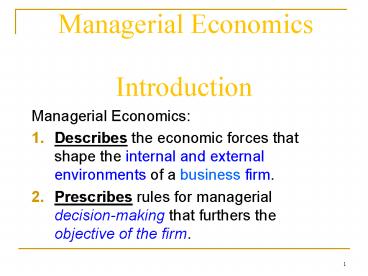Managerial Economics - PowerPoint PPT Presentation
1 / 19
Title:
Managerial Economics
Description:
Two questions: 1. How is the 'value of the firm' defined and measured? ... Global Business conditions. BOP and Exchange rate changes. 12. Terminology Issues ... – PowerPoint PPT presentation
Number of Views:92
Avg rating:3.0/5.0
Title: Managerial Economics
1
Managerial Economics
- Introduction
- Managerial Economics
- Describes the economic forces that shape the
internal and external environments of a business
firm. - Prescribes rules for managerial decision-making
that furthers the objective of the firm.
2
A Decision-Making Model
Objectives
Define the problem
Alternative Solutions
Evaluation
Organizational and input constraints
Social constraints
Implement and monitor the decision
3
Objective of the Firm
- Not market share
- Not growth
- Not revenue
- Not empire building
- Not name recognition
- Not state-of-the-art technology
4
Whats the objective of the firm?
- The objective of the firm is to maximize the
value of the firm. - Value of the firm is the true measure of business
success (of course, from a for-profit
perspective.) - Two questions
- 1. How is the value of the firm defined and
measured? - 2. How do managers go about adding value to the
firm?
5
Managerial Economics
- Q1- Whats the value of the firm?
- The present value of the firms future net
earnings. - ?1 ?2 ?n
- V -------- -------- . . .
-------- - (1r)1 (1r)2
(1r)n - ?t
- ? ------- , t 1, 2, ... ,
N - (1r)t
6
Managerial Economics
- Q2 - How should a manager go about adding
value? - A good map or a travel guide to the curious
land of the Econ should help.
7
Managerial Economics
- A Useful Map
- Profit Total Rev - Total Cost
- ? P . Qd - AC . Qs
8
Theories of Profits
- (Why are profits necessary?)
- Risk-Bearing Theory of Profit - Profits (normal
profits) are necessary to compensate for the risk
that entrepreneurs take with their capital and
efforts - Dynamic Equilibrium (Frictional) Theory -
Profits, especially extraordinary profits, are
the result of our economic systems inability to
adjust instantaneously to unanticipated changes
in market conditions.
9
Theories of Profits
- Monopoly Theory - Profits are the result of some
firms ability to dominate the market - Innovation Theory - Extraordinary profits are the
rewards for successful innovations - Managerial Efficiency Theory - Extraordinary
profits can result from exceptionally managerial
skills of well-managed firms.
10
Managerial Actions
- Controllable factors (internal environment)
- Productions
- Technology
- Marketing Mix
- Employment Policies
- Investment Strategies
- Capital structure
11
Managerial Actions
- Non-Controllable factors(external environment)
- Level of Economic activities
- Economic Regulations
- Unions
- Global Business conditions
- BOP and Exchange rate changes
12
Terminology Issues
- The Marginality analysis
- Economic Profits
- Accounting Profits
- Cash flows
13
The Principle of Marginality
1,000
MC
MB
Hospital Days
1
2
3
4
14
The Principle of Opportunity Cost
- Costs are opportunities sacrificed. To be
precise, the opportunity cost of a choice or
decision is measured by the highest valued
alternative that will be given up. - Cost is not always the monetary expense
- Cost is often implicit rather than explicit
15
Significance of the Opportunity Cost Concept
- Accounting profits Net revenue Accounting
costs (dollar costs of goods and services) - Reported on the firms income statement
- Economic profits Net revenue Opportunities
Costs - Economic profits and opportunity costs are
critical to decision making
16
More examples of useful concepts
- The principal-agent or the agency problems
- Moral hazard
17
Whats Managerial Economics?
- Managerial economics is not a separate management
discipline - Rather, it is a logical and useful tool for
framing and solving management problems.
18
Outline for this Course
Microeconomics Way of Thinking
Sellers, Production, Costs
Consumers, Value and Demand
Markets and Pricing
19
What will we learn?
- useful economic principles for sound economic
decision-making in a management context. - the basics of the demand side of the market and
which factors influence the buyers behavior. - the fundamentals of the markets supply side
-laws of production and how these laws impact a
firms costs. - how firms costs and buyers demand
together determine the firms price
and net profit.































